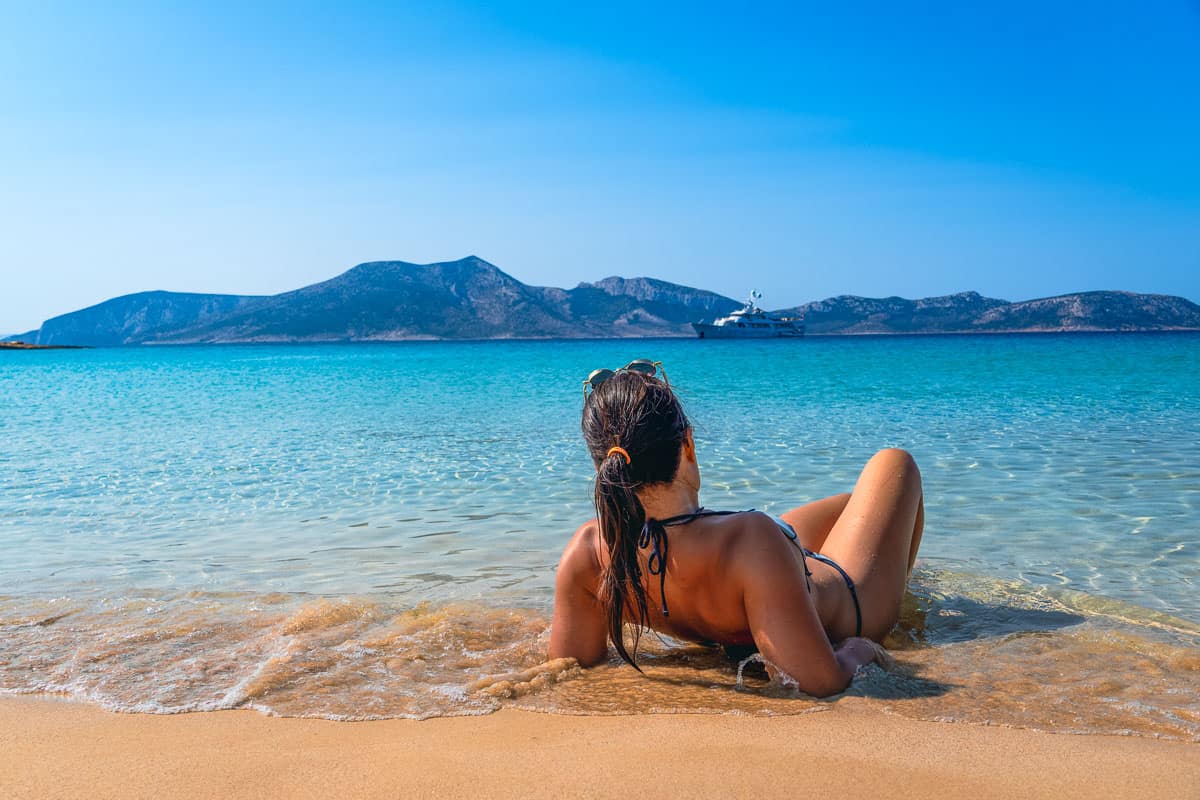Nudity in Greece: A Guide to Naturalism Etiquette & Nude Beaches

Nudism has a long history in Greece, dating back to ancient times when athletes competed in the nude during religious festivals and sports matches. Nowadays, Greece is a top spot for naturalists to sun every surface of their skin on Greece’s beautiful beaches.
For those finally making the leap (out of their clothes) and into their first foray into nudism (like me), here’s the lowdown on naturalism and nudity in Greece.
Inspired by my Greek best friend’s encouragement and example, here are my top tips on when, where, and the proper etiquette before fully embracing the nudist lifestyle. This article delves into Greece’s laws and cultural norms around nudity while also understanding that not everyone may be as enthusiastic about this lifestyle choice.
Easily Plan Your Trip with Some of My Favorite Resources Below!
► Cheapest Accommodation– I Always Use Booking.com
► Adventurous Tours– I Recommend Viator.com
► Car Rental– I Always Use DiscoverCars.com
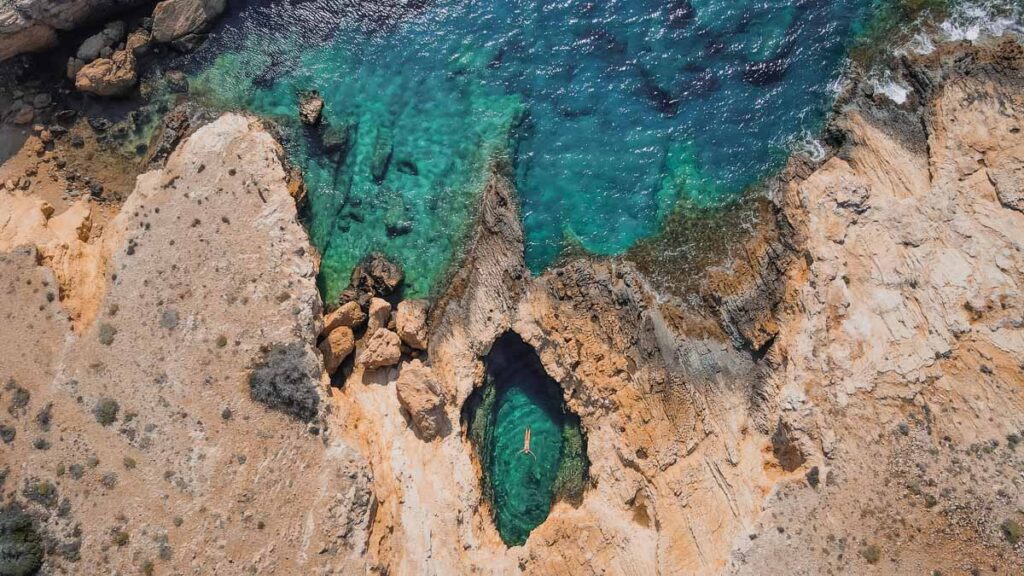
Understanding Naturalism and Nudity in Greece
We all know Greece for its insanely clear waters and pristine beaches. And if you’ve been here before, you’ve probably seen at least some topless sunbathers, which is quite common in many parts of Europe.
Some vocabulary: Naturism, also known as nudism, is the practice of being clothes-free in designated areas, while nudity refers to the state of being unclothed.
Greece has accepted nudism for ages; just think about those famous nude statues and the fact that the original Olympic games were all about going commando. Nowadays, going au naturel is tolerated and a common practice on many beaches across the country.
However, while nudity is not outwardly illegal in Greece, you can’t just walk anywhere with your willy out. It really is just accepted on the beaches. And even then, it’s super important to respect others and their comfort levels.
For example, you may not be able to go butt-naked at a beach or pool during certain times, and not near a school or a place of worship.
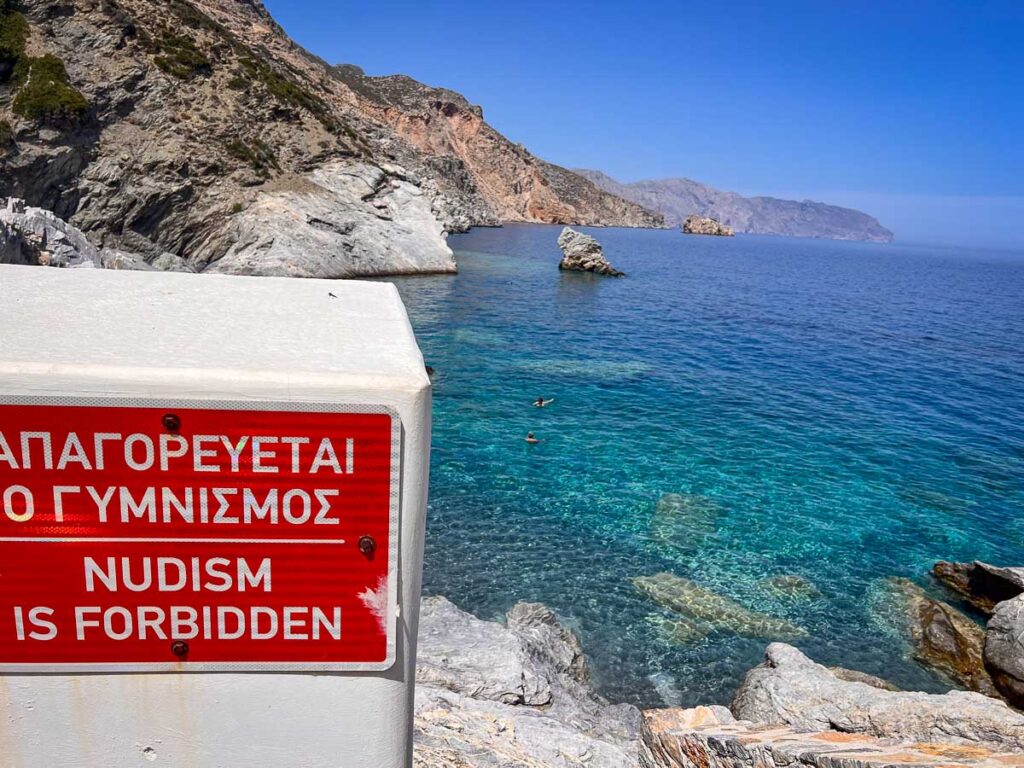
Historical Context of Nudity in Greece
Nudity has been a part of Greek art and culture for thousands of years. In ancient Greek society, nudity was celebrated and considered a symbol of beauty and strength. Athletic competitions, such as the Olympic Games, were held in the nude, and athletes were admired for their physical prowess. The Greeks believed the human body was a work of art and should be celebrated.
In the classical period, nudity became quite the thing in Greek art. They made sculptures of naked gods and goddesses and depicted the human form realistically and naturally. The ancient Greeks thought the human body reflected the divine, so they honored the gods by showing it in their art.
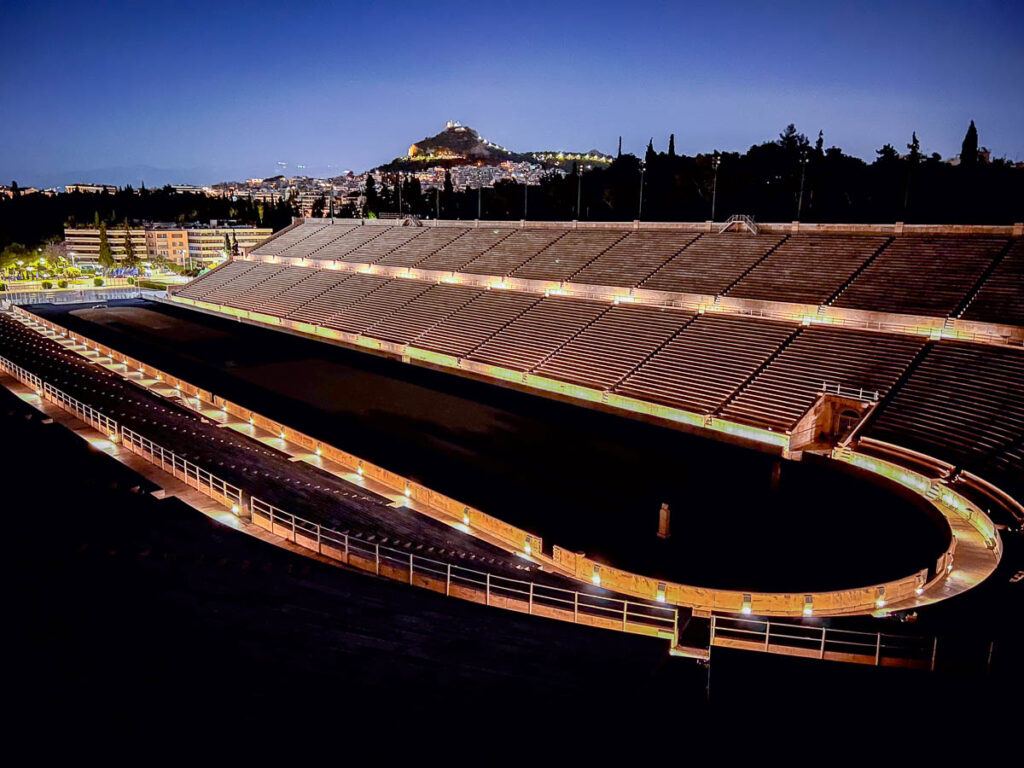
Besides art, nudity was actually a thing in everyday life in ancient Greece. They had public baths where people, both men and women, bathed in the nude. Nudity was also a part of religious rituals where participants often wore minimal or no clothing.
With the rise of Christianity in modern Greece, views toward nudity shifted. Christianity stressed modesty and chastity, deeming nudity sinful and immoral. Consequently, nudity in art became less prevalent, and public nudity was discouraged.
Today, attitudes towards nudity in Greece are somewhat mixed. It’s mostly limited to places like beaches and natural hot springs, where it’s totally fine to let it all hang out.
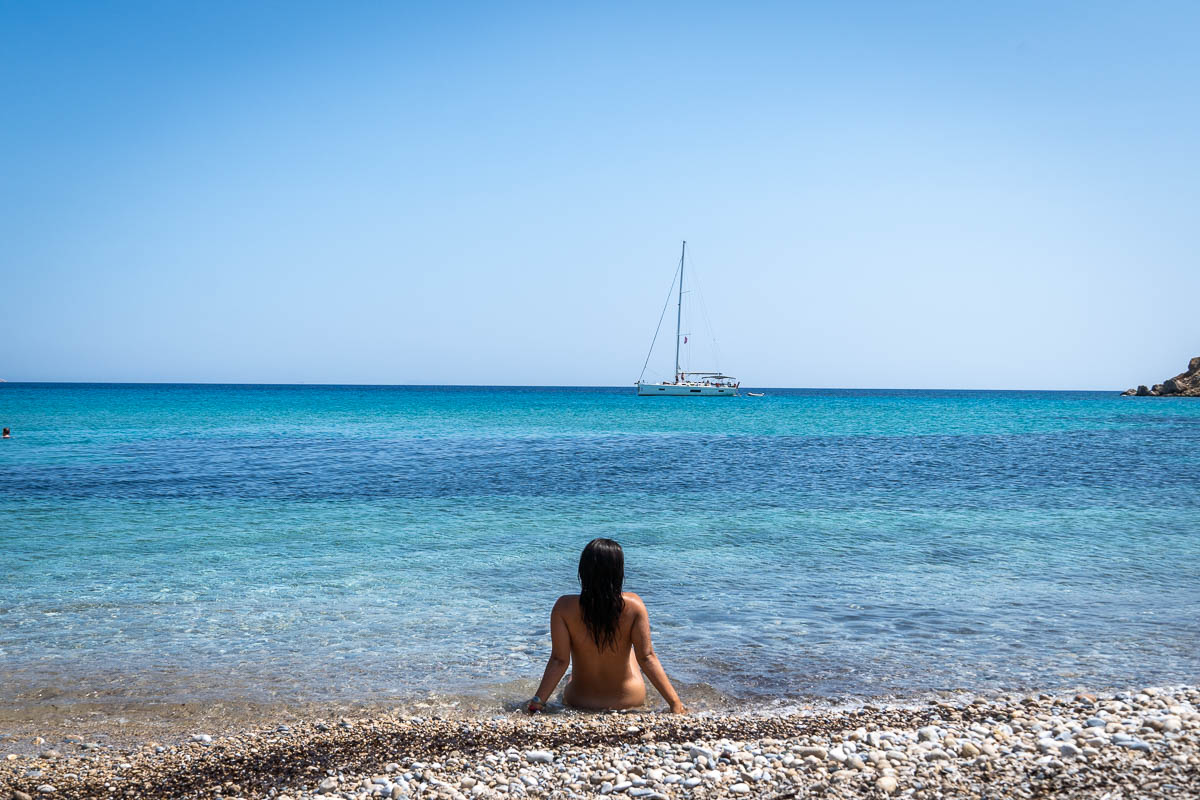
Etiquette Tips and Guidelines for Nudity in Greece
Nudity is common on many of the beautiful beaches of Greece, but follow proper etiquette and guidelines to avoid offending locals or breaking any laws. Here are some tips to keep in mind:
- Some beaches may have designated areas for nude sunbathing, while others may prohibit it altogether.
- While nudity may be acceptable on the beach, walking around town or in public places in the nude is inappropriate.
- Always carry a towel, sarong, or bathing suit to cover up when necessary.
- (Hope this is obvious) But don’t stare or take photographs of others without their consent, especially if they are naked or partially clothed.
- Lots of beaches now have sun beds and restaurants set up. While it’s usually ok to go topless in these areas, being fully naked is not as widely accepted at an organized beach.
- During other times of the year, plenty of remote beaches are perfect for nude bathing. However, in July and August, Greece experiences its peak season, and many beaches tend to get super crowded.
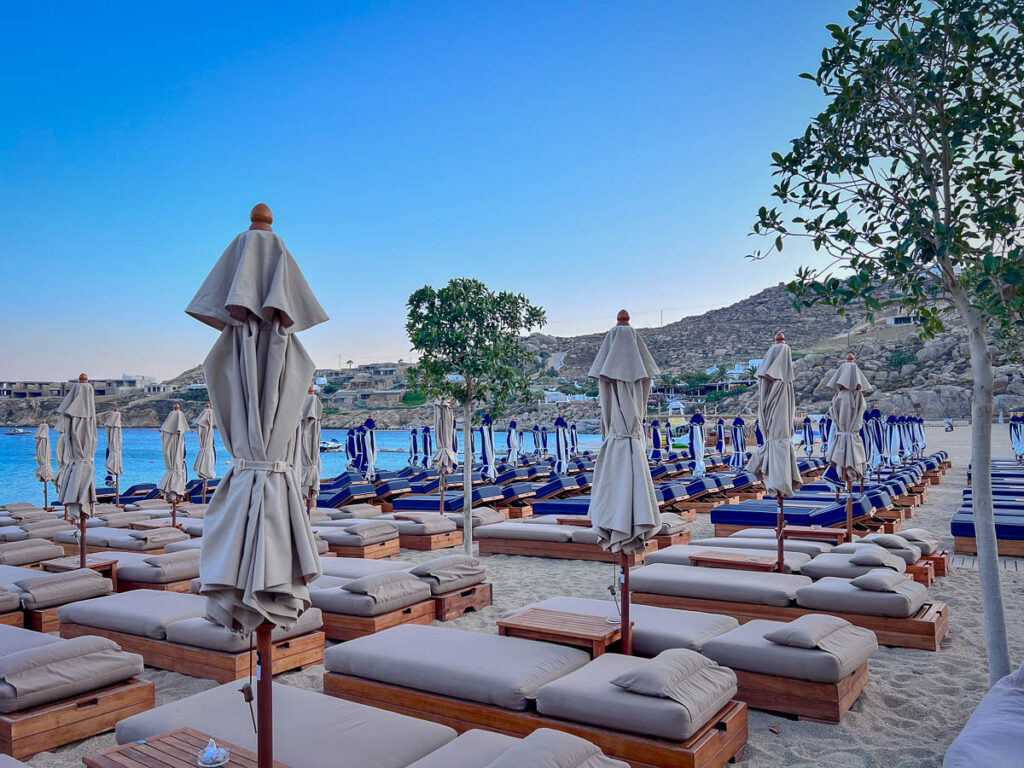
Legal Aspects of Nudity in Greece
While many beaches permit nudity, being nude in all public areas is not appropriate. Engaging in public nudity in a public space, such as city centers or parks, may be considered indecent exposure and could result in legal consequences.
Also, engaging in explicit sexual activities in public areas, even in designated nudist zones, is a big no-no. It’s forbidden, and you could potentially get into some legal trouble.
So while Greece has a generally accepting attitude towards nudity, just follow the local rules and be sensible.
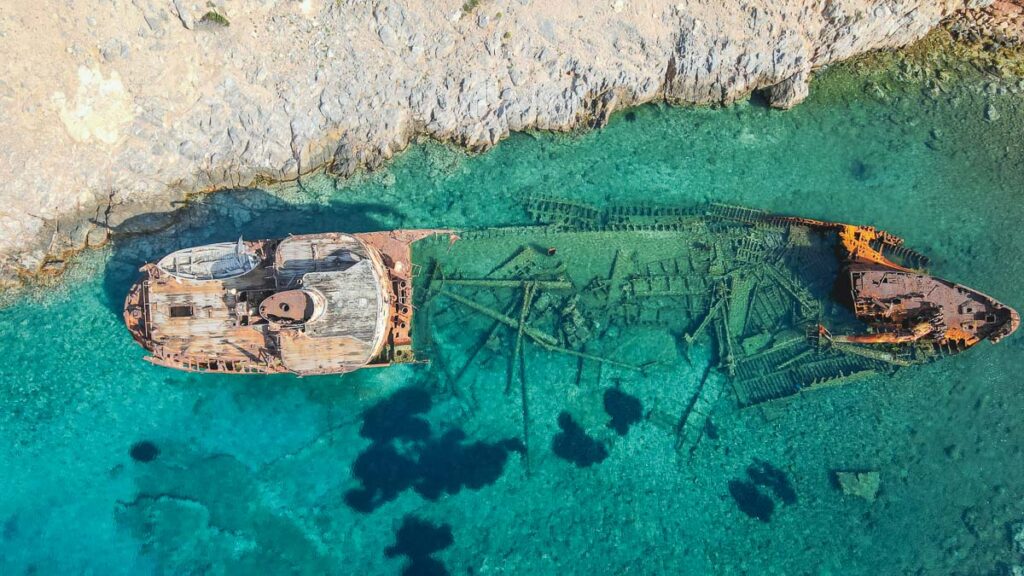
What are the laws regarding public nudity in Greece?
Public nudity is not explicitly illegal in Greece, but outside designated areas, nudity can be considered indecent exposure and can result in a fine or arrest.
Can I be nude on a regular beach in Greece?
People do practice nudity on regular beaches in Greece. Just be respectful of others and avoid offending anyone. But it’s better to stick to designated nude beaches or lesser-visited beaches.
Best Nude Beaches in Greece
Greece is known for its amazing beaches, and there are many islands in Greece where naturism is practiced. Here are some of the most popular Greek nude beaches:
- Faliraki, Rhodes
- Sarakiniko Gavdou, Crete
- Velanio Skopelou, Skopelos
Most Famous Nudist-Friendly Beaches in Greece:
- Voutoumi Beach, Antipaxos
- Red Beach, Crete
- Paraga Beach, Mykonos
- Elia Beach, Mykonos
- Agrari, Mykonos
- Banana Beach, Skiathos
- Mirtiotissa Beach, Corfu
- Chiliadou, Evia
- Halikiada, Agistri
- Mikri Italida, Koufonisia
- Roukouna and the Monastery, Anafi
- Kokkini Ammos, Heraklion
- Kedrodassos, Chania
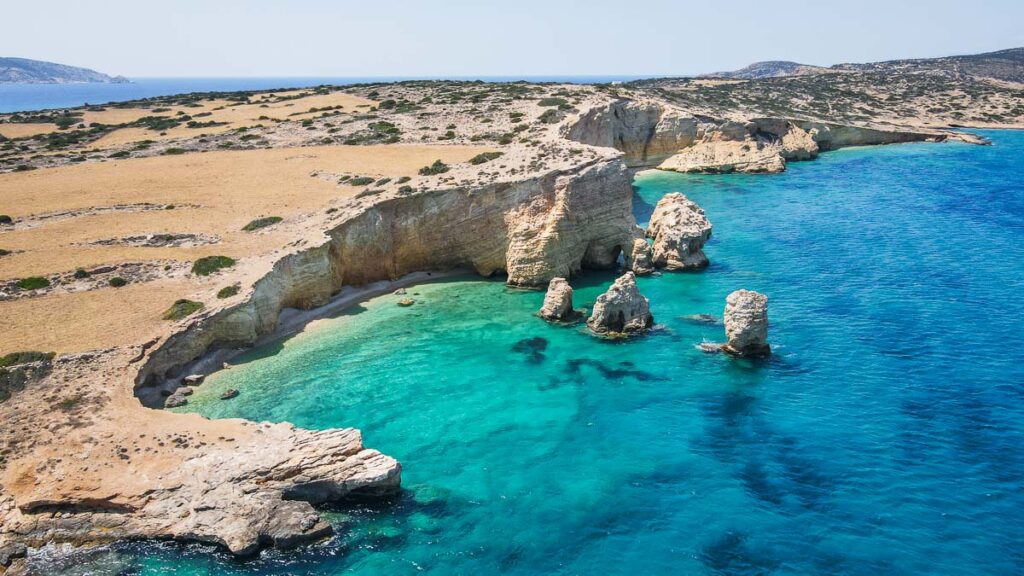
Nudity in Greek Islands
Even if you happen to be on a beach that’s not exactly known for being nudist-friendly, as long as it’s not overly crowded and packed with restaurants and bars, you can generally feel comfortable enough to let loose and embrace the freedom of swimming in the Aegean Sea in your natural state.
There are a few awesome islands that are super nudist-friendly, considered “hippie” islands, like Samothraki. It’s famous for its huge unorganized camping area, where it’s totally normal to hike butt-naked carrying just a fanny pack. Most people swim, shower, and walk around the camp entirely in the buff.
Here, it’s not only tolerated but a place of free expression, utterly unencumbered by societal norms.
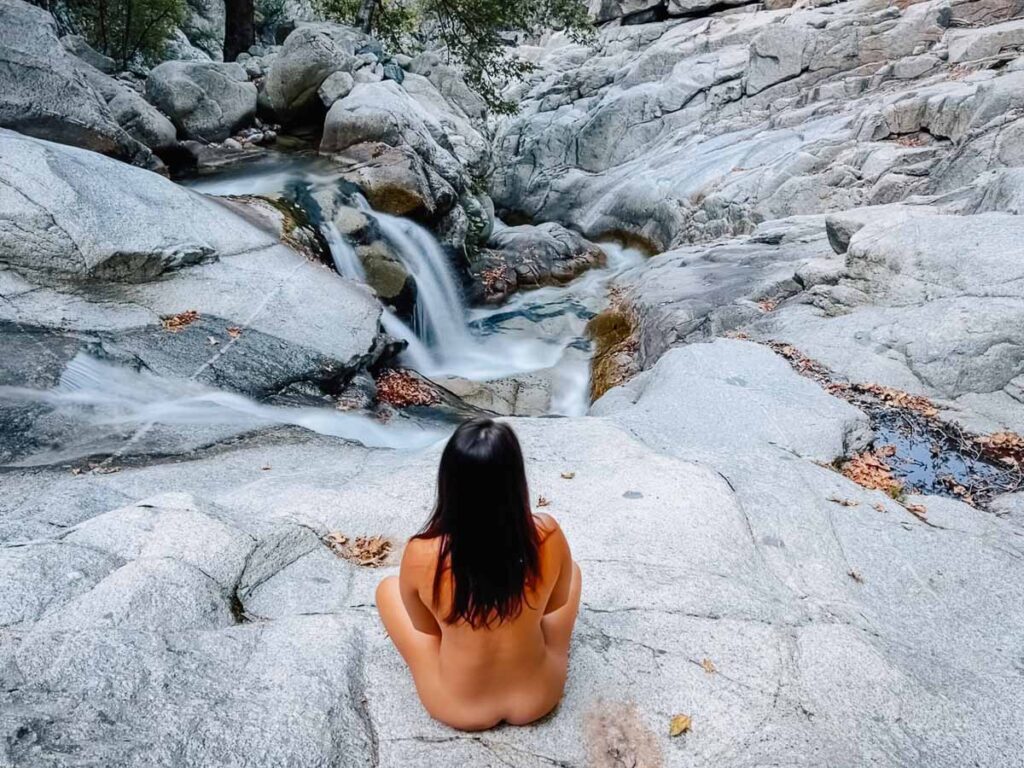
On the flip side, the only spot where I’ve actually come across a sign that said “No Nudity” was in Amorgos, right in front of the Hozoviotissa monastery. And I reckon it is just becuase of the monks, religious factor.
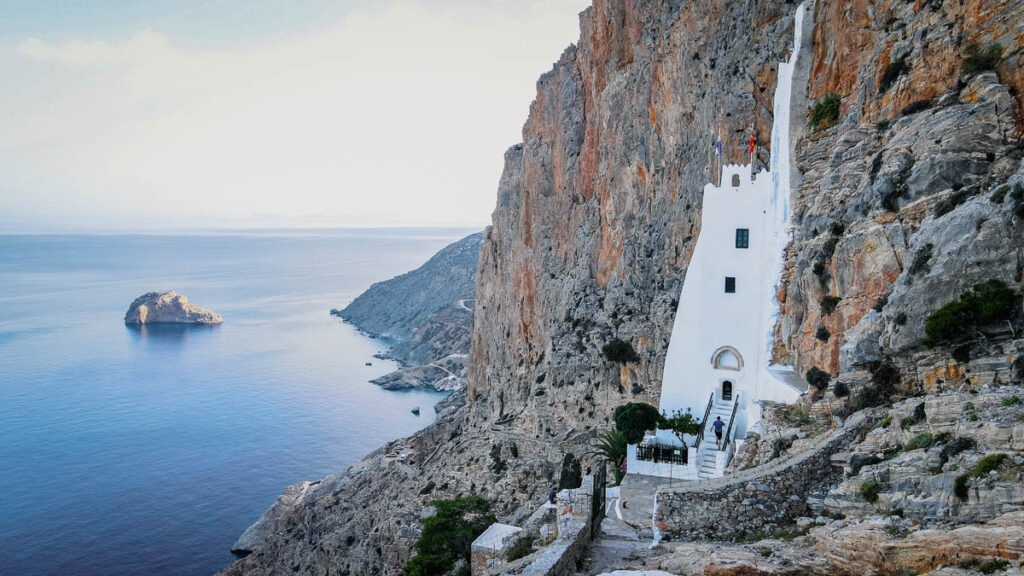
Final Thoughts: Naturalism and Nudity in Greece
All in all, Greece is an incredibly welcoming place to just let loose. Nudity is still very much a thing in Greece, with many beaches catering and accepting those who wish to enjoy the freedom of being clothes-free.
While no laws in Greece expressly prohibit nudity, respect local customs and laws. Some beaches and resorts are designated clothing-optional, while others may have unspoken rules regarding nudity.
Where Next in Greece?
I spent almost two months going around all of Greece. Check out these other posts to see if any of these destinations pique your interest.
- 16 Must-Visit Athens Historical Sites
- 8 Delicious Food Tours in Athens
- 11 Best Athens Private Tours
- Koufonisia Island Travel Guide
- Amorgos Island Travel Guide
- 7 Best Mykonos Private Tours
Have Travel Questions About Greece? Maybe I’ve Answered Them
| TRAVEL RESOURCES |
| ✈️ Find the best tours and activities with Viator to cross off your bucket list and create unforgettable memories 🏘️ Book your accommodation with Booking.com in advance and check availability on the days of your travels. 🧾 Rent a car in advance with Discovercars for those epic road trips at the best price. |
Catherine Xu is the founder and author of Nomadicated, an adventure travel blog that helps travelers cross off their bucket list. Since discovering traveling in 2015, she has lived and journeyed to 65 countries across 5 continents and vanlifed the west coast USA for 2+ years. These days, she splits her time in Southeast Asia and California while sharing her travel stories and resources based on first-hand experiences. Catherine's other works has been referenced in major publications like MSN, Self, and TripSavvy.

